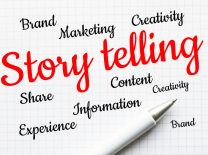Storytelling in Digital Marketing
In business today, standing out can be challenging. With so many brands competing for attention, how do you capture the hearts and minds of your audience? The answer lies in the art of storytelling.
Storytelling is not just a way to share information; it’s a powerful tool that can help your brand connect with customers on a deeper level.
We discuss the importance of storytelling in digital marketing and how you can use it to enhance your marketing strategy.
What is Storytelling in Digital Marketing?
Storytelling in digital marketing involves using narratives to communicate your brand’s message. Instead of simply presenting facts about your products or services, you weave a story that resonates with your audience. This approach helps create an emotional connection, making your brand more relatable and memorable.
Why Storytelling Matters
- Creates Emotional Connections
Humans are wired for stories. We remember stories better than we remember facts and figures. When you tell a story, you evoke emotions. These emotions can lead to stronger connections between your audience and your brand. For example, a story about how your product changed someone’s life can be much more impactful than simply listing its features.
- Engages Your Audience
In a world where attention spans are short, engaging your audience is crucial. Stories draw people in and keep them interested. A well-told story can captivate your audience, encouraging them to continue reading, watching, or listening. This engagement increases the likelihood that they will remember your brand and take action.
- Differentiates Your Brand
With countless brands vying for attention, storytelling can help you stand out from the crowd. Your unique stories set you apart and highlight what makes your brand special. By sharing your values, mission, and the journey of your brand, you create a distinctive identity that resonates with customers.
- Simplifies Complex Information
Sometimes, products or services can be complicated. Storytelling helps break down complex information into relatable narratives. For instance, instead of bombarding customers with technical jargon about a software product, you can tell a story about how it solved a specific problem for a customer.
- Fosters Loyalty and Trust
When customers connect with your brand’s story, they are more likely to become loyal supporters. They feel like they are part of your journey, which fosters a sense of belonging. This loyalty can lead to repeat purchases and word-of-mouth referrals, helping your brand grow.
How to Use Storytelling in Your Digital Marketing Strategy
Now that we understand the power of storytelling, let’s explore how you can incorporate it into your digital marketing strategy:
1. Know Your Audience
Before you can tell an effective story, you need to understand your audience. Who are they? What are their interests, needs, and pain points? Research to gather insights about your target audience. This knowledge will help you craft stories that resonate with them.
2. Define Your Brand Story
Every brand has a story. It could be about how your company started, the challenges you faced, or the values you uphold. Define your brand story and what you want to convey. This story should reflect your brand’s personality and mission, creating a foundation for your marketing efforts.
3. Use Relatable Characters
Incorporating characters into your stories makes them more relatable. These characters can be customers, employees, or even the founder of the company. Share their experiences, struggles, and triumphs to create an emotional connection with your audience. For example, you can highlight a customer who achieved success using your product.
4. Create Engaging Content
Once you have your story, it’s time to share it through engaging content. This could be in the form of blog posts, videos, podcasts, or social media posts. Use visuals, humor, and compelling narratives to draw your audience in. For example, a video that tells a heartfelt story about a customer’s journey with your product can be incredibly impactful.
5. Incorporate Storytelling Across Channels
Storytelling should not be limited to one platform. Incorporate your brand story across various digital channels, including your website, social media, email marketing, and advertisements. Consistency is key. Ensure that your messaging aligns across all platforms to reinforce your brand identity.
6. Encourage User-Generated Stories
Your customers can also be a valuable source of stories. Encourage them to share their experiences with your brand through reviews, testimonials, or social media posts. Feature these stories on your platforms to build trust and showcase the impact of your products or services. User-generated content can amplify your brand’s authenticity and reach.
7. Analyze and Adapt
Like any marketing strategy, storytelling requires continuous improvement. Analyze the performance of your storytelling efforts. Which stories resonate most with your audience? Use analytics to track engagement, shares, and conversions. Adapt your storytelling approach based on these insights to improve future campaigns.
Examples of Effective Storytelling in Digital Marketing
- Nike
Nike is a master of storytelling. Their campaigns often feature athletes overcoming obstacles and achieving greatness. By showcasing these powerful stories, Nike inspires and motivates its audience, creating a strong emotional connection to the brand.
- Coca-Cola
Coca-Cola uses storytelling to create a sense of happiness and togetherness. Their advertisements often depict moments of joy and celebration, reinforcing the idea that Coca-Cola brings people together. This emotional messaging helps maintain brand loyalty.
- Airbnb
Airbnb shares stories of hosts and travelers, showcasing unique experiences and adventures. These personal narratives highlight the brand’s mission to create a sense of belonging anywhere in the world, making it relatable and appealing to its audience.
Storytelling is a powerful tool in digital marketing that can transform the way you connect with your audience. By creating emotional connections, engaging customers, and differentiating your brand, storytelling enhances your marketing strategy.
As you implement storytelling in your digital marketing efforts, remember to know your audience, define your brand story, and create engaging content across various channels.
With the right approach, you can harness the power of storytelling to build stronger relationships with your customers and drive business success.
More insights here


